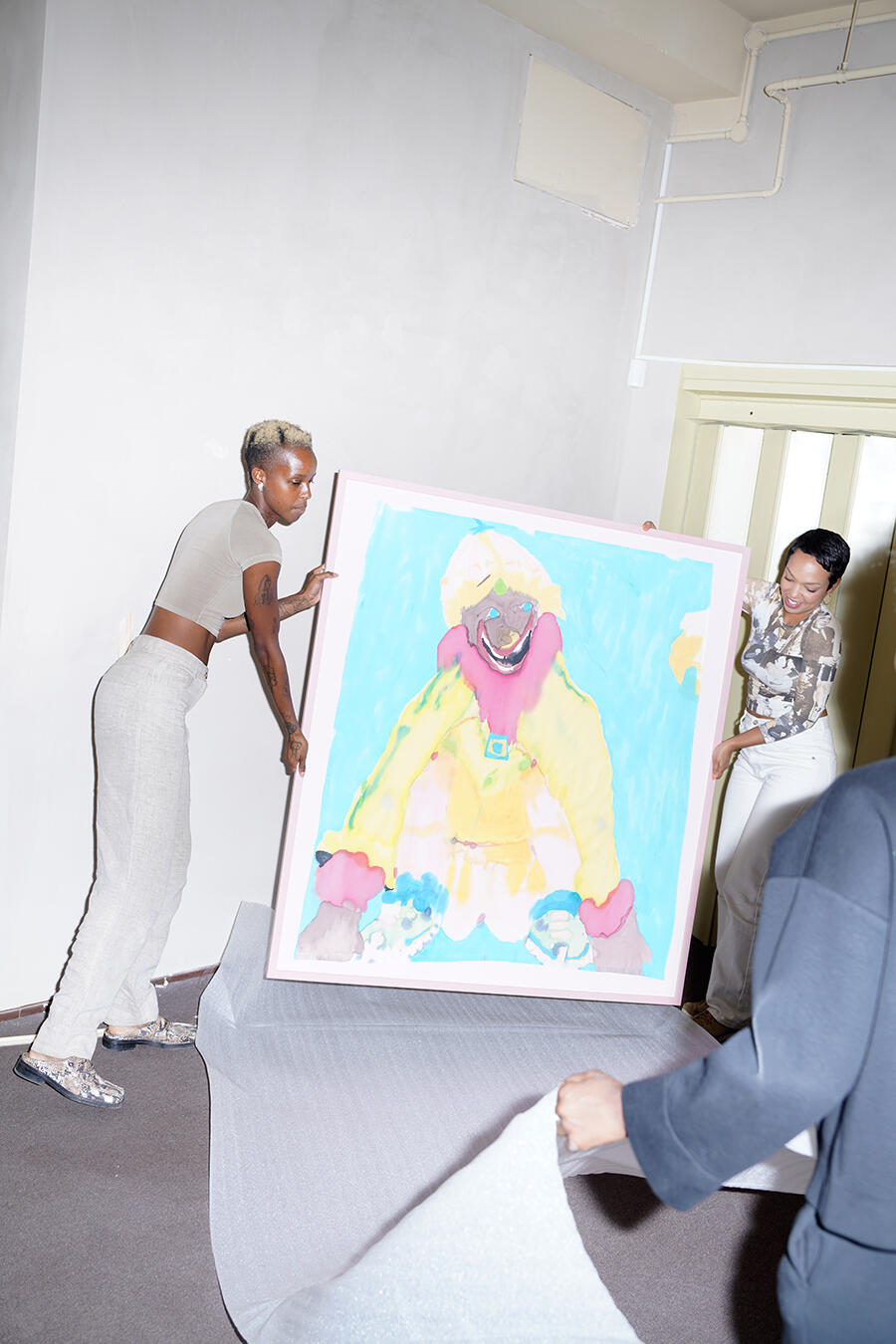The Soft Power of Ronan McKenzie’s HOME
The gallerist’s intimate exhibition space in London is a refuge for underserved creative communities
The gallerist’s intimate exhibition space in London is a refuge for underserved creative communities

London's emerging artists and gallerists have long contended with rising rents and a diminishing number of spaces. In this dossier, frieze profiles four new galleries — HOME, Ginny on Frederick, Guts Gallery and Queercircle — that are cultivating communities and flourishing amidst the city's many challenges.
At 399 Hornsey Road – an unpretentious slice of north London between Finsbury Park and Archway – is a repurposed industrial building. Up two flights of concrete stairs, the door opens onto a large, open-plan space with carpets underfoot, armchairs and ottomans in earthy, clay tones and natural light from large windows bouncing off scrubbed concrete walls. HOME, Ronan McKenzie’s cosy reimagining of the contemporary gallery space, follows in the path of institutions such as east London’s Autograph, launched in 1988, in addressing the fact that, as McKenzie writes in an email interview: ‘Art spaces remain hierarchical and out of reach for most – especially BIPOC audiences – making entering artistic spheres extremely difficult and maintaining a place in them even harder.’

McKenzie grew up in the borough of Walthamstow, east London, briefly attended Central Saint Martins but quit to forge a career as a photographer and filmmaker. She tried her hand at curating and, in 2018, began ruminating on the idea of creating a permanent physical space as an accessible platform for those not seen and heard elsewhere. The evolution from photographer to gallerist came as lockdown hit and forced McKenzie, like many used to traveling for work, to slow the pace of her usual schedule, freeing up time to put into planning and research. HOME opened in November 2020 with a staff of two, but is now run by a close-knit team of six. It is funded predominantly from McKenzie’s own pocket, sustained by the gallery’s community, with occasional corporate sponsorship, such as a partnership with Gucci for the Black Women Artists Grant. The works exhibited are for sale, but most of the events are low-cost or free. (Last year, McKenzie set up a studio at HOME and offered family portrait sessions for GB£10.)
Like most cultural organizations after the height of the COVID-19 pandemic, and in the midst of a cost-of-living crisis, funding remains one of the biggest challenges. ‘We are registered as a limited company, since it is important that we maintain a level of autonomy to ensure we are serving our community in the best possible way,’ McKenzie says over email. ‘However, this does mean that our options are limited when it comes to funding, as we are not a charity or a CIC.’

The meaning of ‘home’ in the vernacular sense has rapidly shifted over the last two years but, for many of us living in the UK who come from diasporic backgrounds, the notion of ‘home’ has always been contested. HOME is designed as a refuge that can not only represent diverse artists but that welcomes diverse audiences into a gallery space. While ‘access’ and ‘inclusivity’ are often-used terms in the art world, few address the simple issue of making people feel at ease – a skill McKenzie has honed through her work as a professional portrait photographer.
HOME is a place of encounter and discovery: a small but carefully formed library of books and publications by POC artists and theorists is accessible throughout the space. Exhibitions tend to focus on interconnected themes of intimacy, family and unity: this year, there were shows by the married couple Johanna Tagada Hoffbeck and Jatinder Singh Durhailay; photographs of bodies pressed close on dancefloors by Bernice Mulenga; while ‘On Love’, a recent 15-artist group show – featuring Phoebe Boswell, Claudette Johnson and Sola Olulode, among others – sought to conjure how it feels, as McKenzie wrote, to ‘breathe heavily at the end of a phone line knowing we will be held, collected and supported at the other end’. While such exhibitions might feel dislocated in a traditional white cube space, here they dovetail into the soft interiors and ambience. An extensive programme of events – readings, open mics, workshops, live music, food and discussions – unfurls around each exhibition and is the heart of HOME. In a particularly brutal era for city living, amplified by the cut-throat political landscape, there aren’t many spots like this, combining the excitement of something innovative with the warm embrace of the familiar.
This article first appeared in frieze issue 230 under the dossier headline ‘New Kids on the Block’.
‘Belonging As Other’ by Shaye Gregan is on view at HOME, London from 29 September until 30 October 2022.
Thumbnail and main image photo: Guy Bolongaro
























